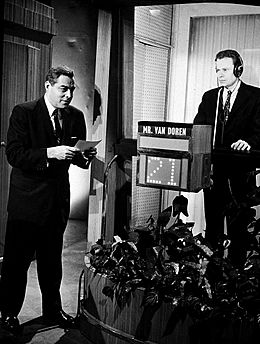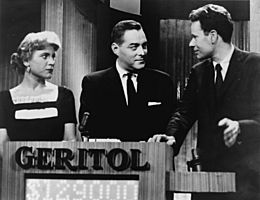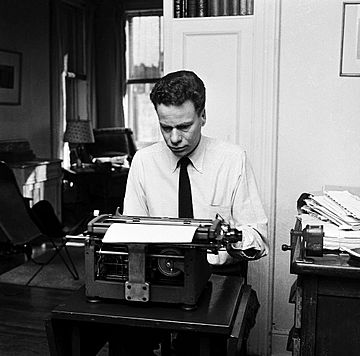Charles Van Doren facts for kids
Quick facts for kids
Charles Van Doren
|
|
|---|---|
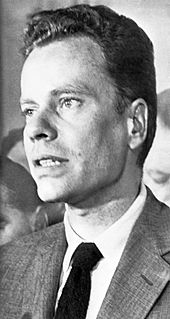
Van Doren in 1959
|
|
| Born |
Charles Lincoln Van Doren
February 12, 1926 New York City, U.S.
|
| Died | April 9, 2019 (aged 93) Canaan, Connecticut, U.S.
|
| Alma mater |
|
| Occupation |
|
| Known for | 1950s quiz show scandals |
| Spouse(s) |
Geraldine Ann Bernstein
(m. 1957) |
| Children | 2 |
| Parents |
|
| Relatives |
|
Charles Lincoln Van Doren (February 12, 1926 – April 9, 2019) was an American writer and editor. He became famous in the 1950s for appearing on a TV quiz show. Later, he admitted that the show's producers had given him the answers.
After this, he worked for Encyclopædia Britannica, Inc.. He wrote and edited many books there. He retired in 1982.
Contents
Early Life and Education
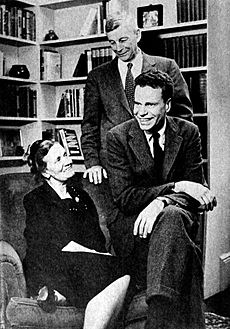
Charles Van Doren was born in New York City. His father, Mark Van Doren, was a famous poet and teacher. His mother, Dorothy Van Doren, was a novelist.
Charles went to the High School of Music & Art in New York. He earned a degree in Liberal Arts from St. John's College. He also studied at Columbia University and the University of Cambridge in the UK.
Becoming a TV Star
On November 28, 1956, Charles Van Doren appeared on the NBC quiz show Twenty-One. He didn't even own a TV at the time. A friend introduced him to one of the show's producers.
The producers thought Van Doren seemed polite and good on TV. They wanted him to beat the current champion, Herb Stempel. They hoped this would make the show more popular.
In January 1957, Van Doren started winning on Twenty-One. He won $129,000, which was a lot of money back then. He became very famous and even appeared on the cover of Time magazine.
His winning streak ended on March 11, 1957. He lost to Vivienne Nearing, a lawyer. After his loss, NBC offered him a big contract. He started working as a special reporter for Today. He even filled in as host sometimes.
Life After the Show
After the quiz show scandal became public, NBC ended Van Doren's contract. He also resigned from his teaching job at Columbia University.
He then became an editor at Praeger Books. Later, he joined the Encyclopædia Britannica. He wrote and edited many books there. One of his most famous books is A History of Knowledge (1991). He also worked with philosopher Mortimer J. Adler on several books.
Van Doren retired from Britannica in 1982. He rarely spoke publicly about the quiz show scandal. He did write an article in The New Yorker in 2008. In it, he shared his side of the story.
He mentioned the movie Quiz Show, which was about the scandal. He said the movie got some things wrong about his life. For example, he was engaged, not a bachelor. He also didn't own a TV, unlike what the movie suggested.
Charles Van Doren spent his later years with his wife, Gerry. They lived in a house on land his parents bought in Cornwall, Connecticut.
He passed away on April 9, 2019, at the age of 93. He died in a retirement community in Canaan, Connecticut.
Published Works
Books by Charles Van Doren
- 1957: Lincoln's Commando: The Biography of Commander W. B. Cushing, U.S.N. (with Ralph J. Roske).
- 1959: Letters to Mother; An Anthology (editor).
- 1968: The Annals of America, 20 volumes, (executive editor, with Mortimer J. Adler).
- 1969: The Negro in American History, three volumes (editor, with Mortimer J. Adler).
- 1972: How to Read a Book: The Classic Guide to Intelligent Reading, with Mortimer J. Adler.
- 1977: Great Treasury of Western Thought, co-edited with Mortimer J. Adler.
- 1980: Shakespeare: Reading and Talking.
- 1984: Webster's American Biographies (editor, with Robert McHenry).
- 1985: The Joy of Reading.
- 1991: A History of Knowledge: Past, Present and Future.
- 2013: The Lion of Cortona: A Novel of the Middle Ages (three volumes).
 | Bayard Rustin |
 | Jeannette Carter |
 | Jeremiah A. Brown |


